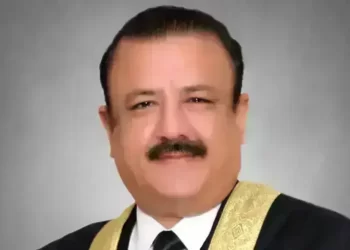BAGHDAD — Protesters angered by the planned burning of a copy of the Quran stormed the Swedish Embassy in Baghdad early Thursday, breaking into the compound and lighting a small fire.
Online videos showed demonstrators at the diplomatic post waving flags and signs showing the influential Iraqi Shiite cleric and political leader Muqtada al-Sadr ahead of a planned burning of the Islamic holy book Thursday in Stockholm by an Iraqi asylum seeker who burned a copy of the Quran in a previous demonstration last month.
The videos showed dozens of men climbing over the fence at the complex, with the sound of them trying to break down a front door. Another showed what appeared to be a small fire being set. Other footage showed men, some shirtless in the summer heat, inside what appeared to be a room at the embassy, an alarm audible in the background.
Others later performed predawn prayers outside of the embassy.
As dawn broke, police and other security officials gathered at the embassy as small plumes of smoke still rose. Firefighters tried to douse the flames from the ladder of a fire truck. Some demonstrators still stood at the site, holding placards showing al-Sadr’s face, apparently left alone by police.
The Swedish Foreign Ministry said in a statement that “our embassy staff are in safety,” without elaborating.
“We condemn all attacks on diplomats and staff from international organizations,” the ministry said. “Attacks on embassies and diplomats constitute a serious violation of the Vienna Convention. Iraqi authorities have the responsibility to protect diplomatic missions and diplomatic staff.”
The Finnish embassy in Baghdad is adjacent to the Swedish embassy, in an area enclosed by blast walls. Finland’s ambassador to Iraq, Matti Lassilla, told the Finnish public broadcaster YLE that the staff of the Swedish and Finnish embassies were proactively evacuated Wednesday and were uninjured.
Iraq’s Foreign Ministry also issued a statement condemning the attack, without explaining how it allowed the breach to happen or identifying who carried out the assault.
“The Iraqi government has instructed the competent security authorities to conduct an urgent investigation and take the necessary security measures in order to uncover the circumstances of the incident and identify the perpetrators of this act and hold them accountable according to the law,” the Foreign Ministry said.
Iraqi police did not immediately acknowledge the attack.
The state-run Iraqi News Agency reported that Prime Minister Mohammed Shia al-Sudani was set to hold “an important meeting regarding the repercussions of Sweden granting a second license to burn the Holy Quran” but did not specify with whom he would be meeting.
Stockholm police spokesman Mats Eriksson confirmed that police had granted permission for a demonstration involving two people outside the Iraqi Embassy in Stockholm on Thursday. He could not say whether the protesters were planning to burn the Quran.
The right to hold public demonstrations is strong in Sweden and protected by the constitution. Blasphemy laws were abandoned in the 1970s. Police generally give permission based on whether they believe a public gathering can be held without major disruptions or risks to public safety.
However, for Muslims, the burning of the Quran represents a blasphemous desecration of their religion’s holy text. Quran burnings in the past have sparked protests across the Muslim world, some turning violent. In Afghanistan, the Taliban have suspended all the activities of Swedish organizations in the country in response to the recent Quran burning.
An Iraqi Christian immigrant last month burned a Quran outside a Stockholm mosque during the major Muslim holiday of Eid al-Adha, triggering widespread condemnation in the Islamic world. According to Swedish news agency TT, the same man was one of those who planned to burn the Quran on Thursday.
A similar protest by a far-right activist was held outside Turkey’s Embassy earlier this year, complicating Sweden’s efforts to convince Turkey to let it join NATO.
In June, protesters who support al-Sadr stormed the embassy in Baghdad during daylight hours over that Quran burning. Another day of protests saw thousands of demonstrators on the streets in the country. Protesters then, as well as early Thursday, called on Iraqi officials to expel Sweden’s ambassador to Iraq.
Al-Sadr, the chameleonic son of a prominent Shiite cleric assassinated in a 1999 attack believed to be organized by Iraqi dictator Saddam Hussein, quickly organized Shiite dispossessed under Saddam against the American occupation after the 2003 U.S.-led invasion.
Saddam loyalists and Shiite extremists alike would soon fight an insurgency against the American forces. Al-Sadr’s Mahdi Army militia fought American forces throughout much of 2004 in Baghdad and other cities. Al-Sadr’s forces are believed to have later taken part in the sectarian killings between Shiites and Sunnis that plagued Iraq for several years after the bombing of one of the holiest sites in Shiite Islam.
Since that time much has changed.
Al-Sadr’s followers have taken part in Iraqi military offensives against the Islamic State group in Tikrit and other cities. He has organized rallies against government corruption, including breaching the fortified Green Zone in Baghdad, the highly secure area housing government offices and many foreign embassies.
He claimed he would bow out of politics last August, following a nearly yearlong deadlock in the formation of a new Cabinet. His party won the largest share of seats in the October 2021 parliamentary elections, but not enough to secure a majority government.









